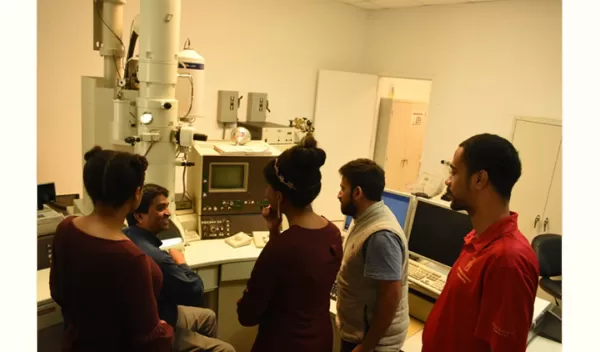
With support from the American Rescue Plan, NSF Research Traineeship program expands to 42 states
With support from the American Rescue Plan Act of 2021, the U.S. National Science Foundation announced 23 new awards through its NSF Research Traineeship program. The research funded by NSF will support graduate students and educate the next generation of STEM professionals that focus on research and development in topics like artificial intelligence and quantum information science and engineering. The $64 million investment funds and expands the program to 42 states, the District of Columbia and the U.S. Virgin Islands, and includes diverse institutions that are not classified as doctoral universities with high research activity.
The NSF Research Traineeship program supports training graduate students in interdisciplinary or convergent research areas of high priority to the nation through a comprehensive traineeship model that is innovative, evidence-based and aligned with changing workforce and research needs. This ambitious research will include projects that focus on trustworthy, ethical AI and quantum information science and engineering -- both top priorities of national importance. These NSF-sponsored projects will delve into training a quantum workforce, defeating antibiotic resistance, advancing surgical technologies, and creating responsible AI.
"Tomorrow's scientific and societal challenges call for a transformation of STEM graduate education," said Sylvia Butterfield, acting assistant director for NSF's Education and Human Resources Directorate. "By combining cutting-edge research and skills training with professional development to ensure students' success across a range of careers, the NSF Research Traineeship program is a vital part of our continued global leadership in science and engineering."
Related to the traineeship program, NSF also announced a new cooperative agreement with the Council of Graduate Schools to set up an Innovation Acceleration Hub for the Innovations in Graduate Education program. The nearly $1 million new hub will foster learning and collaboration among program awardees increasing the number and quality of proposals from historically black colleges and universities and minority-serving institutions.
The awards are listed below.
- Bridges in Digital Health- West Virginia University
- Rivers, Watersheds, Communities: Training an Innovative, Cross-Sector Workforce for Equitable, Multi-Scale Decision-Making Towards Human and Ecosystem Health- Washington State University
- Detecting and Addressing Bias in Data, Humans, and Institutions- State University of New York at Stony Brook
- Collaborative Research in Quantum Leap: A Program for Training a Quantum Workforce- Colorado School of Mines, San José State University
- Transformative Research and Graduate Education in Sensor Science, Technology and Innovation- Dartmouth College
- Windows on the Universe: Establishing Multimessenger Astronomy Inclusive Training- Vanderbilt University
- Future of Work at the Human-Technology Frontier: NSF Traineeship in the Advancement of Surgical Technologies- Duke University
- Understanding the Rules of Life: Decoding the Mechanisms Underpinning Biofilm Function and Architecture in Extreme Environments- Montana State University
- Harnessing the Data Revolution: Convergence at the Interfaces of Policy, Data Science, Environmental Science and Engineering to Combat the Spread of Antibiotic Resistance- Virginia Polytechnic Institute and State University
- Understanding the Rules of Life: Data Driven Biology- University of California-Santa Barbara
- AI: Digital Transformation of Development- University of California-Berkeley
- Sustainable Water Innovations in Materials- Mentoring, Education, and Research- University of Massachusetts-Lowell
- AI-Future of Work at the Human-Technology Frontier: Co-Design of Trustworthy AI and Future Work Systems- George Washington University
- Future of Work at the Human-Technology Frontier: Linguistic Diversity Across the Lifespan: Transforming Training to Advance Human-Technology Interaction- Pennsylvania State University-University Park
- Navigating the New Arctic: Convergent Arctic Research Perspectives and Education- University of New Hampshire
- Quantum Information Science and Engineering: Accelerating Interdisciplinary Frontiers in Quantum Sciences and Technologies- University of California-Los Angeles
- Harnessing the Data Revolution: Computing and Data Science Training for Materials Innovation, Discovery, Analytics- University of Delaware
- AI: Convergent, Responsible, and Ethical AI Training Experience for Roboticists- University of Texas at Austin
- AI: Awareness for Sensing Humans Responsibly with Artificial Intelligence- Rochester Institute of Technology
- Harnessing the Data Revolution: Convergent Research in Integrative and Public Land Management- Western Colorado University
- Convergence of Nano-Engineered Devices for Environmental and Sustainability Applications- University of California-Merced
- Harnessing the Data Revolution: Finding Signal in the Noise to Enable Science-Based Community Response to Change in Coastal Regions- East Carolina University
- Research Training in Sustainable Packaging and Biodegradable Polymer Composites for the Next Generation of STEM Graduates- Tuskegee University
*NSF requires that Track 2 proposals focus on programs from institutions not classified as Doctoral Universities: Very High Research Activity (R1). Requirements for Track 1 and Track 2 are identical.
For more information about the NSF Research Traineeship and Innovations in Graduate Education programs, visit nsf.gov.
